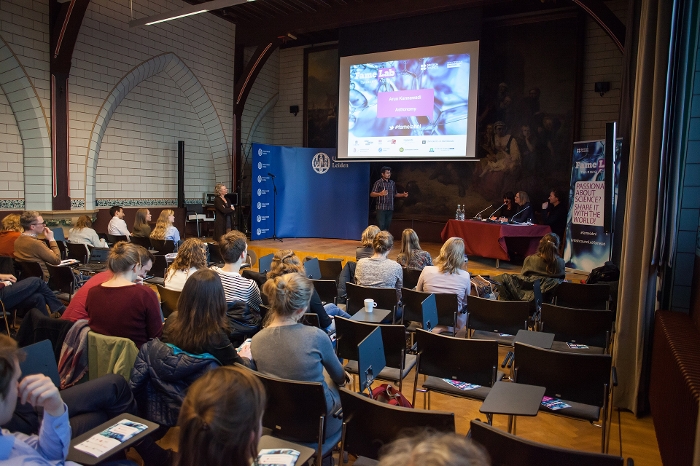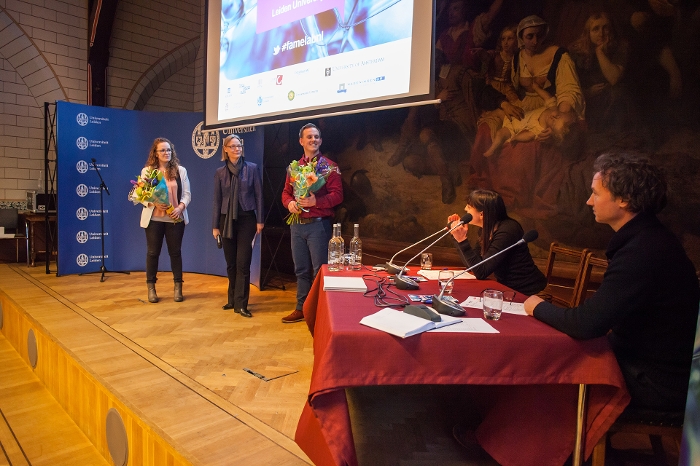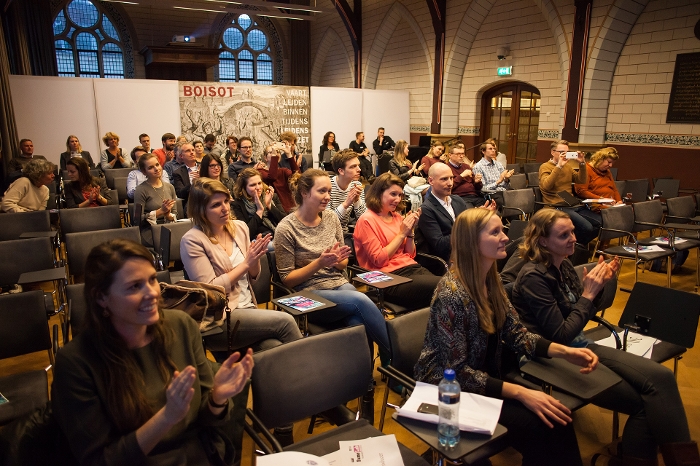
Laura Steenbergen and Christian Eistrup win Leiden FameLab
Which young scientists are best at explaining their research in three minutes and can take part in the national finals? These questions were answered on 14 February in the Academy Building. Researchers Laura Steenbergen (cognitive neurosciences) and Christian Eistrup (astronomy) impressed the judges.
Cycling no hands
Thirteen young scientists took to the stage in the Leiden preliminary heat of FameLab. Aids such as Powerpoint and video were banned, so it was all down to their personal presentation style. All the candidates had taken part in a so-called pitch training offered by the University to prepare for their presentation.

Laura Steenbergen
Researcher Laura Steenbergen explained that she is conducting research in the new field that studies the relationship between the gastro-intestinal tract and the brain. It is a new field of research, but everyone has known for a long time that people in love have 'butterflies in their tummy' and that difficult issues give us a 'sinking feeling in the stomach'. So far, interest in the field has come more from the brain researchers than those in the gastro-intestinal area, but that is likely to change. This area is undergoing rapid developments. There are, for example, indications that people with autism have specific gastro-intestinal flora. It's not for nothing that there is a two-way nerve from the brain to the gastrointestinal tract, Steenbergen believes.
Christian Eistrup
There must be more life in the universe than just us (including animals and plants) here on Earth. It's an exciting thought that PhD candidate Christian Eistrup shares. Why would there be no other life? There are so many planets that the chances are high. Eistrup explains that you have to look for oxygen: wherever there is oxygen, there are living organisms. Oxygen may not be the earliest sign of life, but it does occur very early in the lifecycle. Eistrup's presentation was very convincing.
Jury assessment
The jury, comprising Vice-Rector Magnificus Hester Bijl, Professor of the Public Understanding of Science Bas Haring and lecturer in Argumentation, Rhetoric and Public Speaking Roosmaryn Pilgram, focused on three aspects in the presentations: content, charisma and clarity. When the winners were announced, Steenbergen was complimented on the content of her performance, a well as its clarity. Her explanation of her subject was both insightful and clear.
It was also ovvious to the audience why Eistrup was selected: his charisma. His was far and away the most expressive presentation: he spoke with his whole body.

Masterclass in Media and Science Communication
The winners of the preliminary round will be offered a two-day masterclass in Media and Science Communication by the Royal Netherlands Academy of Arts and Sciences.
Tips from Bas Haring
After each presentation, the jury asked the candidates questions. This part of the performance also counted towards the assessment and Steenbergen's competent answers were one of the reasons she was selected. Bas Haring's questions also included some tips, such as:
- One of the candidates started by using a friend as a concrete and personal example. Haring: 'That's great, but then end with your friend, too. Everyone wants to know how the story ended.'
- Another candidate welcomed the audience, which the others didn't do. That gained an extra point.
- One candidate left a few seconds of silence.Haring: 'Did you do that on purpose?' 'Yes, because I wanted what I had just said to sink in.' An extra point for that.
- At the end of the evening, Haring also said: 'If you practise your presentation too often, the risk is that it will come over as unnatural. Make sure your story stays fresh.'
One candidate went blank, but once she recovered, she carried on confidently with her presentation. She was able to leave the podium with her head held high.

The national final of FameLab will take place on 3 May in Tivoli/ Vredenburg in Utrecht. The winner of that heat will go on to the international final in England in June. There are now more than 30 countries taking part in the competition. Leiden's Marcia Godijn was one of the finalists in 2015. She didn't win, but she was a jury member in 2016.
FameLab is organised by the British Council , whose aim is to spread scientific knowledge. In the field of science, FameLab is the platform for this, which is why only science researchers take part. For Leiden, that means young researchers from the Facultiesof Science and Medicine, and occasionally a candidate from the 'hard' social sciences, like this year's Laura Steenbergen.
, whose aim is to spread scientific knowledge. In the field of science, FameLab is the platform for this, which is why only science researchers take part. For Leiden, that means young researchers from the Facultiesof Science and Medicine, and occasionally a candidate from the 'hard' social sciences, like this year's Laura Steenbergen.
